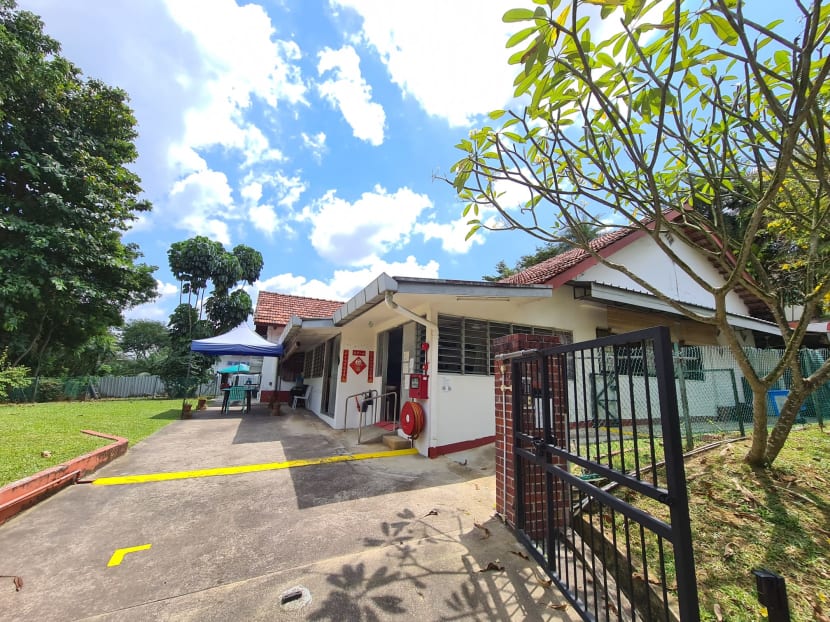'Disheartened': Two weeks on, care homes and residents grapple with ban on visitors

The exterior of Soo's Nursing Home, located in Bukit Timah. (Photo: Soo's Nursing Home)
SINGAPORE: When 72-year-old Mdm Lim heard about the temporary ban on visits to residential care homes, her first reaction was dismay as she thought of her sister-in-law.
Her 85-year-old sister-in-law, a post-cancer patient with multiple health conditions, lives in Soo's Nursing Home. Family, friends and church members would regularly take turns to visit.
But since the suspension kicked in on Sep 13 amid growing COVID-19 clusters in nursing homes, these visits have come to a halt.
“Family ties are important. You cut that out ... you don’t want elderly to feel we are abandoning them or rejecting them,” said Mdm Lim.
Two weeks on, her sister-in-law, Ms Wee, is feeling “disheartened” by the restrictions.
“I haven’t seen (my family) for some time. I can’t see my friends who often come and visit me. I don’t have the opportunity to meet them and to enjoy our conversations,” she told CNA over the phone.
But Ms Wee, who is unmarried, said she has been keeping busy by writing and doing some puzzles. It also helps that the nursing home's staff organise exercises for residents and are attentive to their needs, she said.
RESIDENTS’ WELL-BEING TAKES A HIT
The suspension, which is scheduled to end on Oct 11, is not the first time in-person visits to residential care homes have been barred due to concerns around the pandemic.
But each time this happens, residents’ well-being is impacted, said Mr Kelvin Ng, the general manager of Pacific Health Nursing Home.
This is especially for those who usually get visitors at least once a week. Such residents “tend to be a little more anxious and upset” by the sudden absence of visits, he said.
A spokesperson for St Luke's ElderCare added that some residents feel lonely or abandoned, especially if they have cognitive impairments and are unable to fully understand why their family members cannot visit.
To address this, home operators said they have been keeping a closer eye on their residents.
At MINDSVille@Napiri, a home for people with intellectual and developmental disabilities, care staff and allied health professionals conduct regular checks on residents’ emotional well-being, said Mr Bryan Lim, a director at MINDS.
Pacific Health’s Mr Ng echoed this, adding that nurses, physiotherapy aides, art therapists and social workers have been roped in to identify residents who “display a change” on this front.
“These residents are then engaged psychologically and emotionally, by means of activities and programmes such as colouring, art and craft, board games, chit-chat sessions,” he said.
The director of Soo’s Nursing Home, Andrew Soo, stressed the role staff members play in providing comfort for residents, especially via one-on-one interactions.
For family members who want some contact, video or phone calls have become the go-to.
“If you can’t visit, that’s not the end. It’s making an effort to do telephone conversations, call as and when you can,” said Mdm Lim.
She said she regularly sends photos to her sister-in-law, along with “cute videos of our little panda in the zoo, my granddaughter’s dancing performances, concerts, et cetera”.
“So although you are not there physically to tell, it’s all shown.”
STAFF MAKING SACRIFICES TOO
The suspension of in-person visits has also intensified the burdens placed on staff in residential care homes.
Pacific Health’s Mr Ng said there has been an “overwhelming number" of calls from anxious family members of residents, requesting daily updates and asking when visits can resume.
In response, the home's staff contact family members more frequently to provide regular updates and help alleviate their anxiety, he said.
“Many family members also either bring home-cooked meals or order food online, which staff have to pick up from the gate and bring to the respective residents,” he said.
But perhaps the “toughest sacrifice” staff make is the loss of their social lives, said Soo’s Nursing Home’s Mr Soo.
“(It’s not a rule) but I discourage them: Just reduce your social meetings or, if possible, the entire social circle in this period, because the numbers are really rising everywhere.”
SAFETY FIRST
The safety of residents and clients is paramount, said MINDS’ Mr Lim, adding that all activities and programmes continue to be carried out in line with safe management measures.
St Luke's ElderCare agreed that a balance must be struck between resident engagement and safety.
For instance, it still holds celebrations for special occasions, such as the recent Mid-Autumn Festival or birthday milestones – but these have been scaled down and involve fewer residents than before.
Following the emergence of clusters in care homes, Pacific Health’s Mr Ng added that authorities have put in place additional measures such as split zones, N95 respirators while in the wards, antigen rapid tests for all staff twice a week and fortnightly polymerase chain reaction tests.
Staff members are also constantly reminded of health precautions and infection control practices, he said.
"The management is also actively looking into the welfare and the morale of the staff to tide them through these difficult times, so that staff do not compromise on these protective measures and quality of care."
While cases continue to rise, Soo’s Nursing Home’s Mr Soo said: “We’re just waiting for everything to clear up. Residents really miss the outside world.”
The elderly Ms Wee agreed. “The first thing is I want to do is see my family.”
BOOKMARK THIS: Our comprehensive coverage of the COVID-19 pandemic and its developments
Download our app or subscribe to our Telegram channel for the latest updates on the coronavirus pandemic: https://cna.asia/telegram







